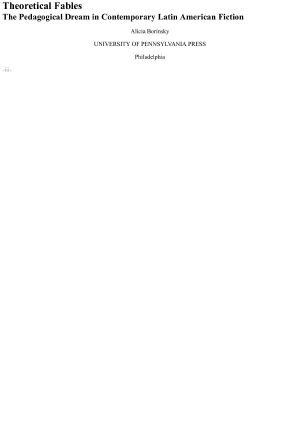Theoretical Fables · the Pedagogical Dream in Contemporary Latin American Fiction

- Authors
- Borinsky, Alicia
- Publisher
- University of Pennsylvania Press
- Tags
- history and criticism , spanish american fiction 20th century history and criticism , caribbean & latin american , general , literary criticism , spanish american fiction , american , semiotics & theory , philosophy , 20th century , literature philosophy , literature , argentine fiction 20th century history and criticism , argentine fiction , hispanic american
- ISBN
- 9780812232349
- Date
- 1993-10-29T00:00:00+00:00
- Size
- 0.36 MB
- Lang
- en
Alicia Borinsky argues that the contemporary Latin American novel does not just ingeniously dismantle the referential claims of the more traditional novel; it offers a postmodern version of the lessons taught by fiction.
Latin American fiction, perhaps the most inventive literature of recent decades, seems marked by its self-reflexivity, by its playful relationship to history and the everyday, and by its concerns with the ways in which language works. But is it, Borinsky asks, really a literature whose primary goal is to raise metafictional questions about writing and reading? While the effects of this literature include dismantling the illusions of realism, naturalism, and historicism, the haunting and disturbing energy of its major works lies in their capacity of invoke a region beyond literature through literature.
Theoretical Fables progresses by way of close readings of the works of eight canonical--and not quite canonical--Latin American Authors. Borinsky argues that the Latin American "theoretical fable" has its origins in the work of the early twentieth-century Argentinean writer Macedonio Fernandez. In this light she studies the works of Jorge Luis Borges, Gabriel Garcia Marquez, Julio Cortazar, Jose Donoso, Adolfo Bioy Cesares, Manuel Puig, and Maria Luisa Bombal.